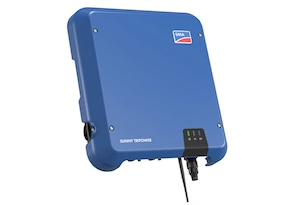In most cases, the voltage provided by a system of solar panels is not directly suitable for use. First of all, most household appliances are made for alternating current, although an ordinary light bulb also burns just fine on direct current. In addition, it would be annoying if fluctuations in light would affect connected appliances. Solar panels are therefore usually connected to the mains, which provides a constant AC voltage of 230 volts. The solar power thus supplements the power from the mains, and vice versa.
To be connected to the mains, the direct current must be converted to a constant alternating voltage of 230 volts. This is where the inverter comes in. The inverter first converts the DC voltage into a sinusoidal AC voltage. This alternating voltage is then transformed to a voltage slightly above the local mains voltage. This transformation is necessary to ensure that the solar power is actually “fed back” into the grid. There are many different types of inverters; check out our inverter overview to see which is the best choice.

An example of an SMA inverter (STP 3.0-6.0)
To properly convert the generated energy from a system of solar panels, the inverter must be accurately tuned to the expected power output. An inverter has a limited range within which the input voltage and power must fall. Thus, an inverter must be found for each quantity of solar panels. Our consultants use special design software to find the perfect inverter(s) for every solar panel system.
These days many people add home battery systems to their solar panels. Hybrid inverters are inverters to which both solar panels as well as bateries can be connected: a two-in-one solution as it were. Note that they also work perfectly fine without batteries attached, but at least they will be ready in case you want to add batteries at a later stage.

Each brand and type of solar panels has its own electrical characteristic. This so-called IV characteristic can usually be found on the manufacturer's official data sheet. For the efficiency of the system as a whole, it is important that the characteristics of the solar panels are as similar as possible. In practice, it is unwise to connect panels of different brands or types to a single inverter.
The MPP tracker contsantly varies the voltage on a string of panels in order to always get to the Maximum Power Point (MPP), i.e. the maximum power that the panels can produce at that moment.
Nowadays, many inverters have 2 of these MPP trackers. This allows strings with different types of panels to be connected to one inverter, although in the individual strings the panels must all be identical.
In the past, inverters would sometimes make an audible buzz or beep when operating, but the newest models are virtually silent. Some higher power models are equipped with a fan that runs at higher internal temperatures. Most inverters make a soft clicking sound when they start up in the morning or switch off in the evening, which is caused by relays opening and closing. It is therefore inadvisable to install inverters in the bedroom; although the inverter does not work at night, it can switch on early in the summer morning, possibly waking a light sleeper.